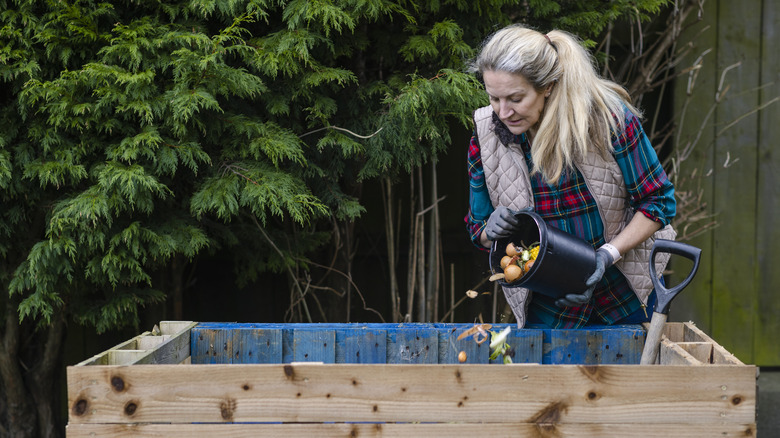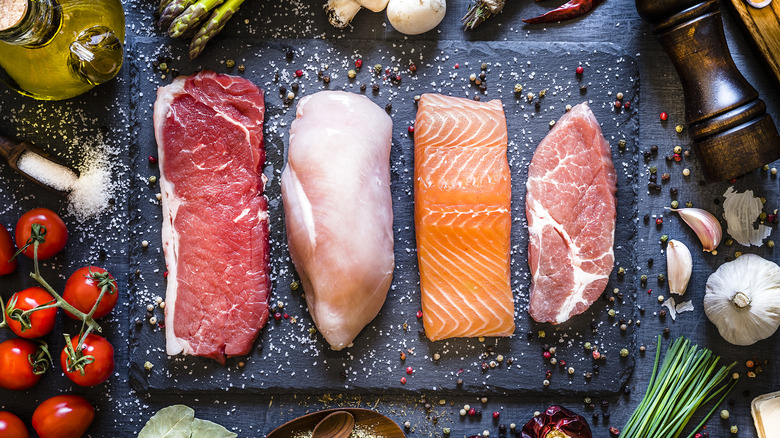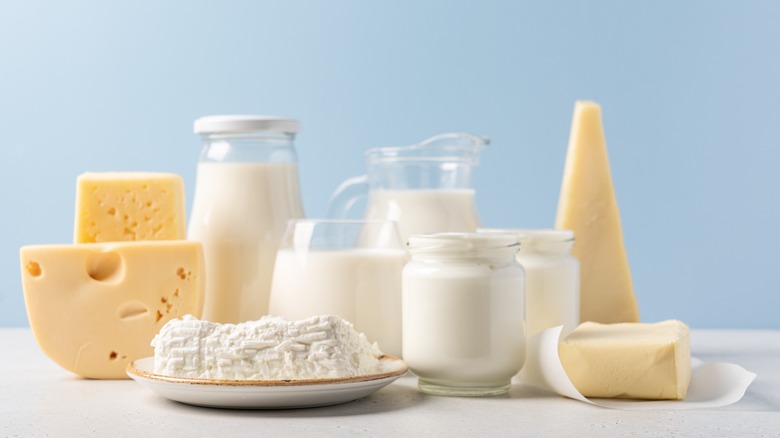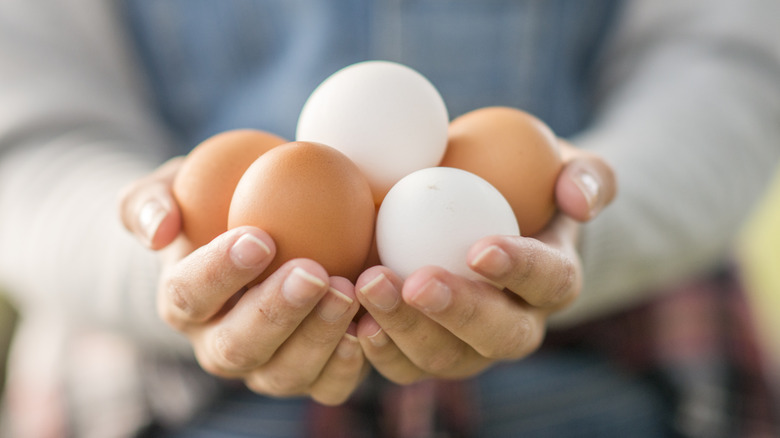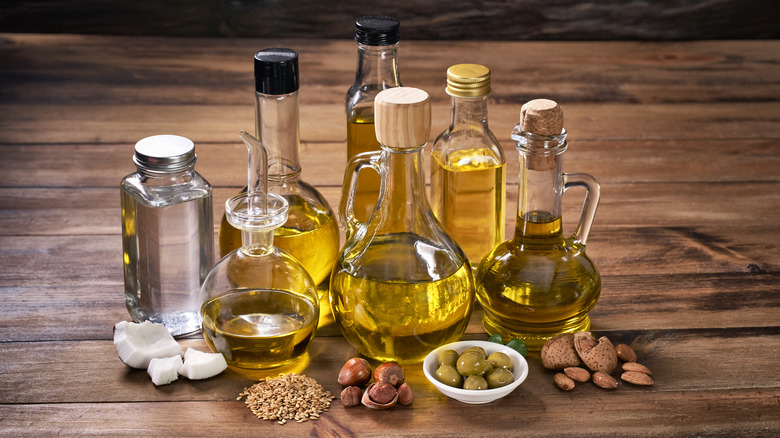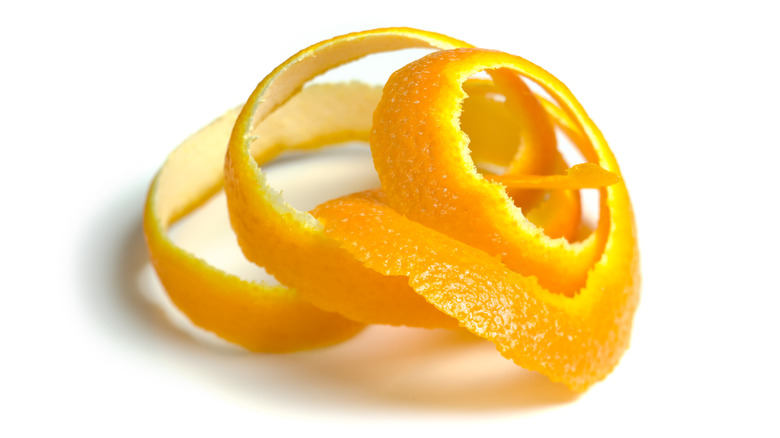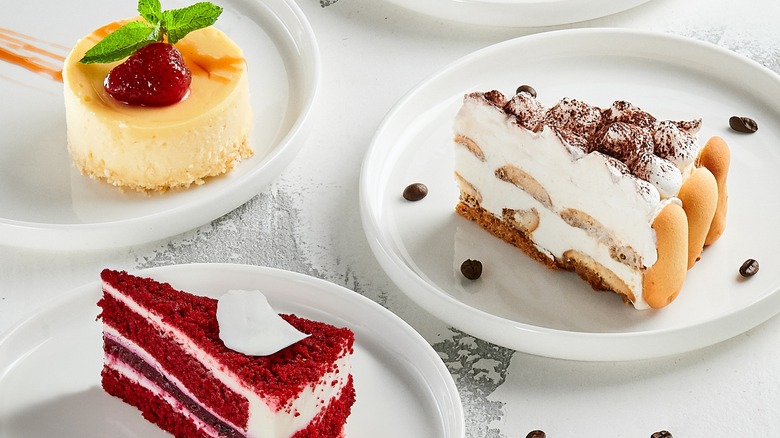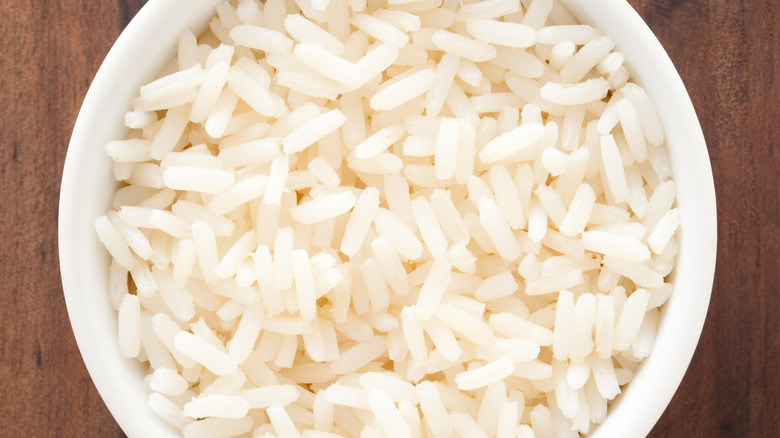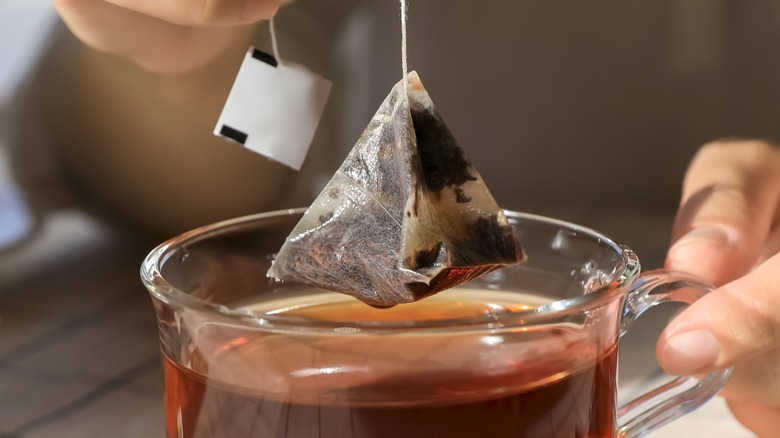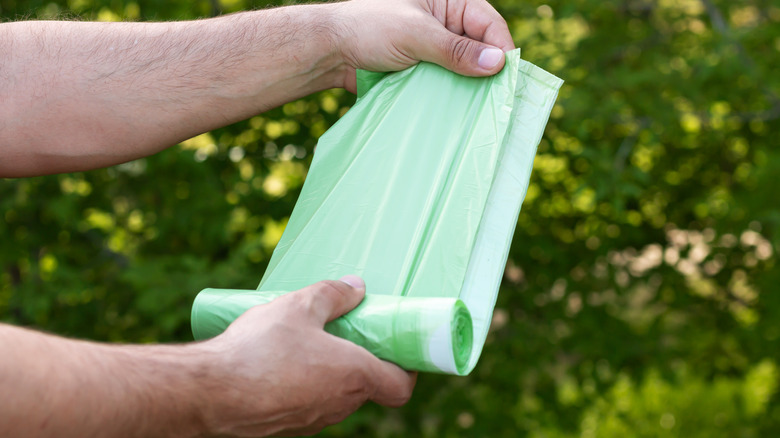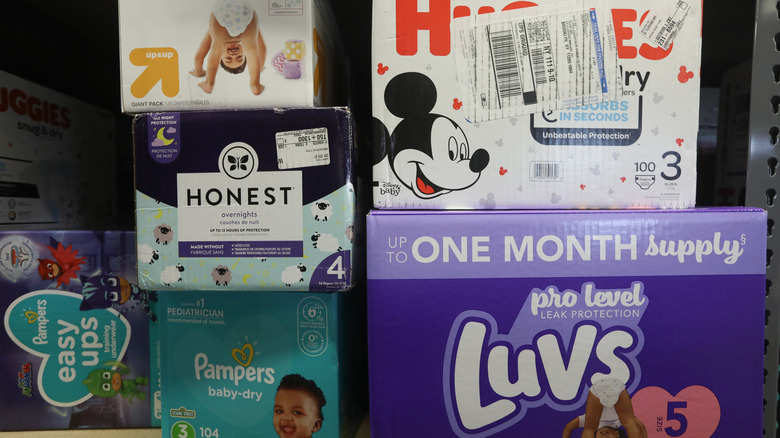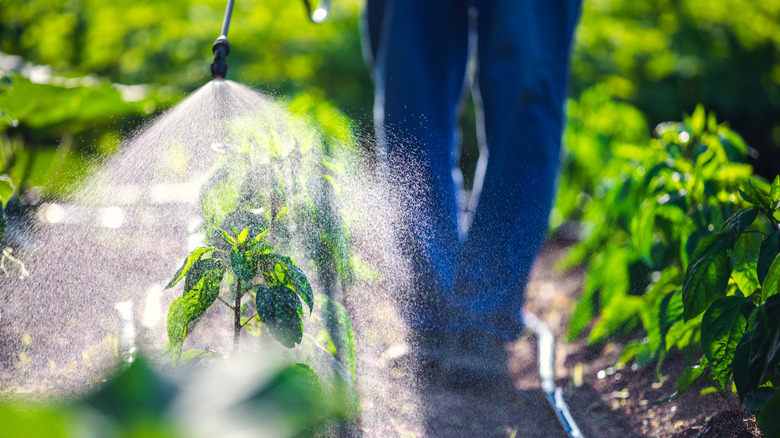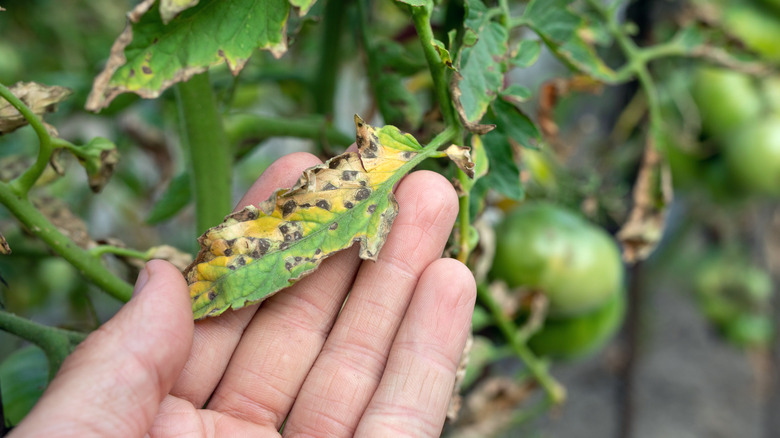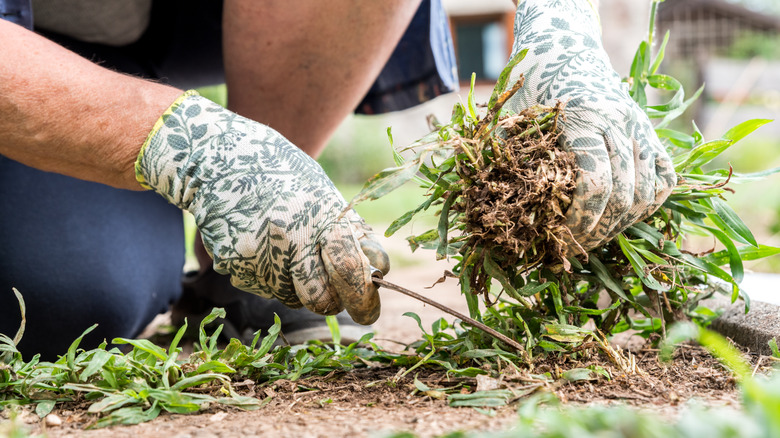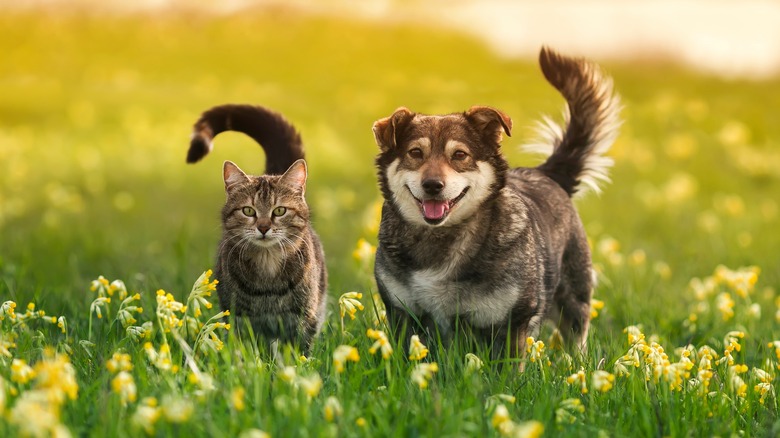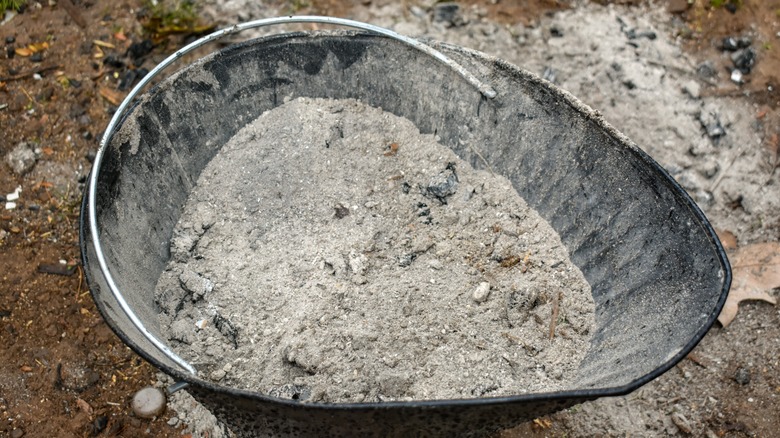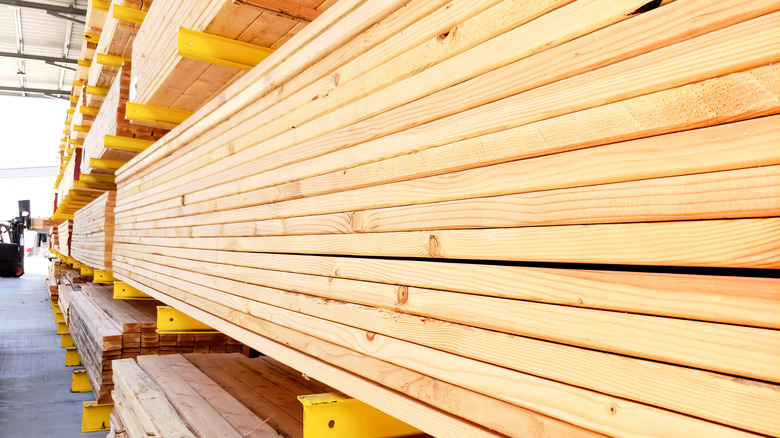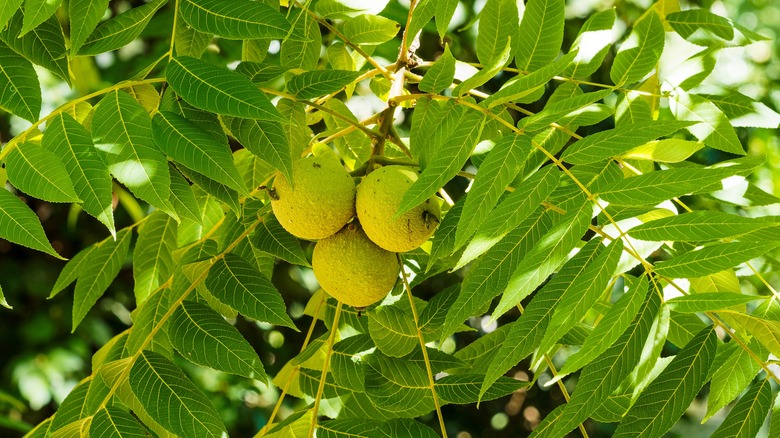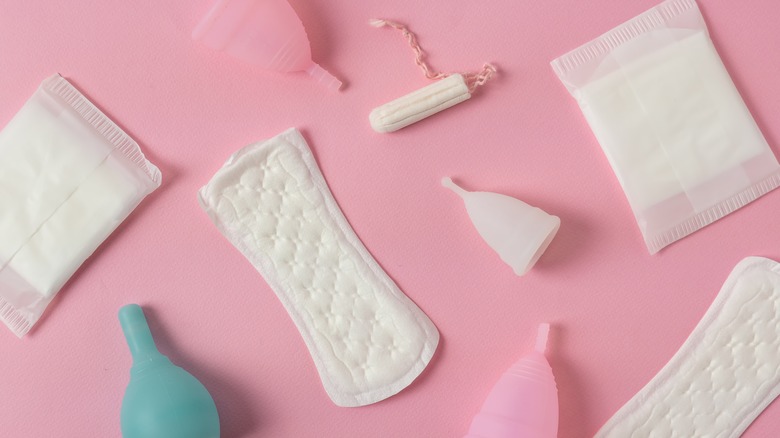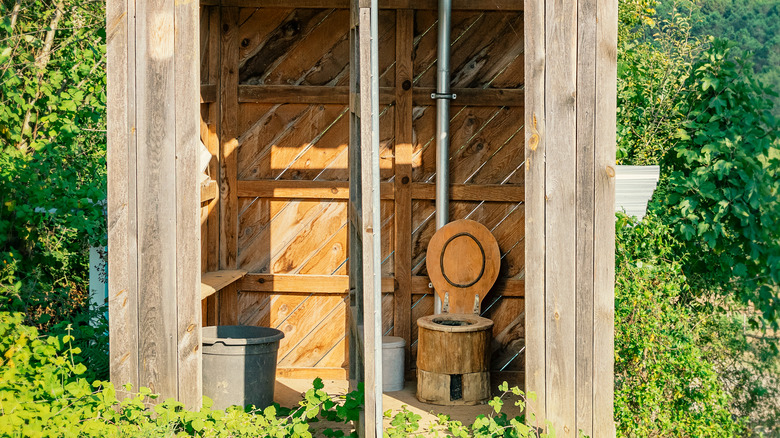Things You Should Never Put In Your Compost Bin
Composting is a time honored tradition that has been practiced by humans for thousands of years. At its core, composting is the recycling of organic matter by way of decomposition, and there are several different ways you can go about doing it. The matured compost is used as a soil amendment for gardens, enriching the earth with nutrients, and creating lasting sustainability. And while there are plenty of things that can be composted, there are an equal amount of things that should not.
You are almost always safe composting things like yard trimmings, leaf matter, egg shells, most other food waste, and certain types of paper. However, you still need to be careful about the waste that goes into your compost pile. Most who compost use a process known as aerobic composting. Put simply, the method utilizes air, some moisture, and various microorganisms to break down the organic matter in the pile and turn it into compost. Though aerobic composting can compost much, it can't compost everything.
We've compiled this list as a go-to for anyone wondering what, and why, certain things do not belong in your compost bin. While some of what is on this list might seem harmless at first glance, they can affect your compost bin in such a way as to render it unusable. That could be attracting pests, encouraging bad bacteria, or inhibiting the decomposition cycle. Here are 20 things that you should never put in your compost bin.
Meat, fish, and bones
Animal meat, fish, and bones will almost always appear at any "Do Not Compost" list. Nothing is going to attract pests like rats, raccoons, foxes, and the like to a compost pile more than the promise of meat. The scent can attract animals from several miles away, and they will very likely ruin whatever progress your pile has made.
Meat, fish, and bones also won't break down as easily, or as quickly, as other organic matter will. This will result in uneven decomposition, which, in turn, won't get your compost broken down to the point where it needs to be to enrich your soil. It also smells horrible. Rotting meat, while attractive to pests, can introduce unwanted, often harmful, bacteria into your compost, and will certainly stink up your yard in a jiffy.
There are specialized composting methods and machines that can handle the decomposition of meat and fish, but for a normal pile it isn't recommended. You could burn the bones into powder, however, and sprinkle them in that way. It is an excellent source of calcium. Also, if you butcher your own meat, like chickens, their offal, blood, and feathers can go into the compost pile. They're actually great sources of nitrogen that won't draw pests when properly mixed into the pile, and will actually help heat up the compost, encouraging decomposition.
Dairy
Dairy products are specialized, highly refined products, even when they're raw. Milk, cheese, and yogurt are not good for composting because they have higher moisture and fat content than almost any other type of organic matter. As a result, dairy fats will inhibit the proper conditions required for optimal composting because they create water resistant walls around other materials in the heap. These barriers will interrupt the balance of water and air flow, which is critical for optimal aerobic composting.
Now, you could use dairy in another type of composting called anaerobic, which is composting without air. While this can be done on purpose, more often than not it is done by accident. If there is too much dairy in an aerobic compost pile, it could create accidental anaerobic environments. The added moisture will create breeding ground for the types of bacteria that thrive without oxygen. This encourages decomposition, albeit more slowly, and in a much smellier way than aerobic composting.
The unfortunate thing about anaerobic composting is the fact that it isn't really the best option for most homes. Unless you've got an airtight container that you can continue to add to, you are really better off with aerobic composting. Plus, the spoilage of dairy products will yield an extremely unpleasant smell and bring those unwanted pests and bacteria back to your compost pile.
Eggs
We want to start by noting that this only applies to what is inside the eggs. Egg shells, of any variety, are excellent additions to compost piles. They bring calcium and several other nutrients, which will decompose, and used by plants as nourishment when added to soil. However, raw or cooked eggs will rot and spoil. Spoiled eggs, for those who know, will create a near-vomit inducing smell, which will do one of two things to your compost pile.
The first is obvious: pests. Like so many of the other items on this list, the smell of rotting eggs will attract those pests that will turn your compost bin or pile into a bacteria strewn heap. Second, there is the unhealthy bacteria that rotting raw eggs could bring. Salmonella and e. coli, can infect your compost pile. In order to kill it, you need to get the compost very hot, which won't happen if the decomposition process has been inhibited by pests and food spoilage.
Now, it may sound as though we're being repetitious, but it is only because it is important for you to know these things. You want to create a compost heap that is going to benefit your garden, which, in turn, will nourish you.
Cooking oils/fats
Cooking oils and fats should not be added to compost for the same reason dairy shouldn't. The cooking oils will create those water resistant areas which cause reduction in air flow, increase moisture, and turn the compost anaerobic. Plus, cooking fats like bacon grease or vegetable oil take a very long time to break down, meaning that by adding them to your standard compost pile, you will cool the pile down and thereby slow down the active decomposition required to make good compost.
You can, however, compost organic cooking oils, like olive or sunflower oil, in incredibly small quantities. This is provided they haven't actually been used to cook anything like meat or fish. If you have a little bit of oil leftover in the bottle that you know you're not going to use, it's perfectly acceptable to add that small amount into your compost bin. It is not going to adversely affect the overall process. The trouble only happens if you use massive quantities.
Another downside is the fact that used oils and fats have remnants of whatever they were cooking. For example, if you used some lard or olive oil to cook a steak then tossed the leftover oil to your compost heap, you're going to have all the rodents in the neighborhood honing in to your bin like flies to dung.
Citrus rinds
Citrus rinds are one of those things that you might think couldn't do damage to a compost pile, but they absolutely can. By their very nature, citrus rinds are highly acidic. Adding them to a compost pile is going to throw off the pH balance that has been achieved by the composting material. And you want compost that is relatively balanced. Compost that is too acidic can negatively affect the plant it is used on, unless that plant prefers more acidic soil. Plus, the change in pH will cause the compost to slow its decomposition, leading it to cool down, which means it can't kill any harmful bacteria.
Citrus rinds are especially harmful if you are doing any kind of composting with worms. Earthworms are one of the organisms that helps compost and gardens thrive. However, citrus rinds are going to kill them because of those high acidity levels. If you toss citrus into your vermicomposting bin, which is essentially a tub of worms working overtime to make your soil amendment, you run the very real risk of killing quite a few of them.
What to do with all those leftover citrus rinds? Instead of throwing them in the garbage, why not save them and use them to make some all natural, homemade household cleaners? You can add lemon, orange, or grapefruit peels to vinegar to make a very simple cleaning solution that is going to make your home smell wonderful.
Baked goods
That leftover birthday cake that you had at your recent party? No, you cannot put it in your compost bin. This is because baked goods, especially enriched ones, bring together all those things that invite pests to your pile: dairy, fats, moisture, and sugar. Too much sugar, like anything else, can wreak havoc on your compost pile. Not in the way you think, however.
Despite the fact that sugar and baked goods break down relatively quickly, and can actually jack up the heat of your compost and lead to better decomposition, they will not do so quickly enough to ward off pests. Rodents are particularly fond of sugar. While their leftover fecal matter is actually going to encourage more decomposition and be great food for worms, they will tear up your compost heap and take away the very things that need in order to make good compost. So, while cake might actually decompose, inviting more pests to your pile is never worth it.
Instead of tossing old cookies and pastries, see if there is a way that you can repurpose them into other treats like trifles or crumbly toppings. If all else fails, pigs and chickens will happily devour leftover baked goods, so long as you don't feed it to them too often.
Cooked grains
In general, don't try to compost rice, or any other cooked grains for that matter. They are not going to do your pile any favors. Even if they are uncooked, grains of any variety are going to attract rodents and other small pests. Still, it is the cooked grains that are really going to make things difficult for the pile. The cooked grains are very moist and will rot incredibly quickly. While you might think this is good for compost, it isn't. The grains will eventually decompose and become one with the pile, but it is what happens in between those two points where the harm can occur.
Because of the moisture, cooked grains make a haven for the types of bacteria that will be harmful to the composting process. They won't necessarily be harmful to you or your plants once they've decomposed, but the presence of the unwanted bacteria will cause the composting to slow down to such a degree that your pile isn't working the way it should.
A great solution to this is to create a supplemental vermicomposting station. Worms love cooked grains, especially rice, and will devour it and return their waste to the earth before the grains have the opportunity to create an issue. Vermicomposting is very easy to set up and can serve as a great way to compost some things that you couldn't in a normal pile.
Tea bags
Tea bags might not seem overly harmful to a compost pile, but rest assured, they have the potential to cause some damage. The bags will not decompose naturally, even the organic ones. This is because virtually all tea bags contain trace amounts of polypropylene, which is the chemical sealant that holds the tea bag together. Because the chemical doesn't break down, it will instead leach out into the rest of the compost, potentially slowing down or halting that all important process of decomposition.
The tea itself, however, is 100% compostable. In fact, tea is really excellent for adding to compost as the leaves are naturally high in nutrients and minerals. Things like phosphorus, nitrogen, and potassium are excellent for allowing compost to blossom and reach the stage where it is taking in enough energy and material to create excellent fertilizer.
While certain tea bags are made out of biodegradable material, they also contain several billion microplastics. So, it's really just best to err on the side of caution and keep them out of your compost pile. If you want to add the tea, just cut open the tea bag and remove the tea leaves. Keep them in a container until it is filled, then add it to your compost pile. Repeat as often as you drink tea.
Plastic
Plastic should never, under any circumstance, be put into your compost bin. One of the great problems of waste on the earth, it takes between 20 to 500 years for plastic to decompose. So imagine how long it's going to take in your average compost pile? Plastic is a particular problem with larger scale compost facilities, which will sometimes accidentally incorporate discarded single use plastics into compost by shredding them down into small micro-particles. While this is not going to happen to your pile, everyday plastic bags, even the ones that say they can be composted, should not be added to your compost.
Compostable plastic is a complete misnomer. The bags are made out of chemically manipulated plant sugars and fibers, which, in theory, can be composted. However, in this plastic form, they cannot be composted in nearly enough time for it to actually become one with the earth, unless you're using a highly specialized process. It still takes eons in compost timing for these biodegradable plastics to decompose in a normal compost bin.
Avoid putting any plastics in your compost bin as a general rule. They are much better off being recycled and used for other purposes. Though those countertop compost bins may come with those "compostable" green plastic bags, use them as transportation vessels only and dump the raw organic matter. No plastic should go anywhere near your compost heap.
Coated cardboard
To clear up any confusion there might be here, we want you to know that straightforward, unadulterated cardboard is absolutely okay to compost. Think standard boxes, paper towels and toilet paper rolls, and egg cartons. However, it is the coated cardboard where you can run into issues. Any cardboard that has a lot of color or some kind of coating to it cannot be composted. Diaper boxes, for example, are highly colorful and glossy, meaning that they have come into contact with, and contain, the types of things that don't belong anywhere near your compost.
The coatings on the cardboard are made using heavy metals, paints, chemicals, and other volatile compounds. These are not the sort of things that can be assimilated into the ground naturally. In fact, all those harmful materials will leach into your compost, rendering it somewhat toxic. The chemicals won't only inhibit the compost's capability to decompose properly, but when it is applied to plants, the chemicals, metals, and other compounds could end up killing the plant.
So, despite it being a paper product, coated cardboard is not going to break down naturally and return to the earth without harmful followers.
Pesticide-treated plants
As compost is intended to be a totally natural method of creating better fertilizer, it should come as a no-brainer to avoid, at all costs, putting something in there that is going to adversely affect the natural decomposition process. So, while it may seem totally harmless to throw any old garden plant into your compost, know that any which have been treated with chemicals have no place in your pile.
Plants that have been treated with chemical fungicides, herbicides, or pesticides need to, unfortunately, go in the garbage. Sure, the residual chemicals will get rid of any unwanted insects and deter mammalian pests, but they will also kill the special organisms that help build the compost as well. Worms are especially susceptible. Then there are the residual effects on the plants that use the compost for fuel. The chemicals could stunt their growth and lead to other lasting effects along the way.
Unless you've grown them yourself or purchased from a trusted organic source, there is a high likelihood that plants bought from large box or grocery stores have already been treated with some kind of chemical pesticide. So, as with other chemical additives on this list, avoid putting them in your compost bin. Unless your compost is so hot that it can kill off residual pesticides, the risk is not worth it.
Diseased plants
Just as it is best to avoid composting plants that have been doused in chemicals, it is also good to avoid composting diseased plants. Or is it? Depends who you ask. One camp holds that the addition of diseased plants is not going to affect the compost in the long run, provided that the internal temperature of the pile is enough to kill the disease before it spreads. The other camp says that you just shouldn't do it. We're siding with the latter for the following reason.
As noted, the home compost pile is not going to reach a high enough temperature to ward off the disease in the plants. This is the same issue we've found with the spreading of dangerous bacteria like salmonella. Unless you are actively aerating it and feeding it with the proper amounts of nitrogen, you are not going to get those temperatures, the disease will spread, and eventually affect the plants.
While there are methods and additives that will get compost good and hot, it needs to be an active process. A lot of people who have compost bins will simply leave them alone to decompose over time. In this case, they do not get to those temps required to kill off harmful diseases and organisms, so you should not be adding those things to the pile. Instead, bury the plants in a far off corner of your yard.
Weeds
Weeds are an inevitable part of gardening. The moment you spot weeds growing in your garden, you should pull them immediately. These trimmed early weeds can go into your compost bin no problem. However, if you ignore the weeds and allow them to go to seed, these cannot be composted. Weeds that have gone to seed can release millions of seeds that will spread across your compost heap. Then, the compost essentially becomes superfood for the plants, turning your heap into a hill of weeds. At the very least, you'll know you've made good compost, though it won't have gone to its intended purpose.
Weeds that have gone to seed are pretty easy to identify. Think of a dandelion that has gone from a small, yellow petaled flower, to the fuzzy white lollipop we all liked to blow on as kids. Other weeds are less easily identifiable, but you should be able to locate the seed pods when you're weeding and keep them out of your compost.
Like with the bacteria and other diseases, the compost needs to be really hot in order to prevent the weed seeds from staying alive once they have germinated. This way they get fried before they have a chance to pop up out of the compost heap. The best way to deal with seeded weeds is to lay them out on a tray and dry them out in the sun.
Dog or cat waste
Do not, in a million years, ever add dog or cat feces to your compost pile. There are types of animal waste that will benefit compost, such as pig, cow, rabbit, and chicken manure. When applied properly and aerated, these animal wastes can add much needed nitrogen to the compost pile. They are beneficial, whereas dog and cat feces do the exact opposite.
Their feces are highly toxic, and can easily do harm to both the health and wellbeing of plants, and people. Dog feces, for one, carries harmful bacteria and parasites such as ringworm and tapeworm. These can turn your compost into a glowing heap of hazardous waste. Okay, we're exaggerating about the glow, but the hazardous part is completely accurate. Compost with dog feces in it is totally unusable, provided it is for edible vegetation. You can compost dog feces in a separate pile used only for landscaping and inedible plants.
Cat feces are also known harbingers of toxoplasmosis, which can be especially dangerous for pregnant women. Toxoplasmosis is caused by a parasite and can cause severe illness or even potential death. If added to compost, these parasites will take over and affect the fertilizer and can contaminate the plants, which will find their way into your system and cause harm.
Charcoal ash
Using wood ash has been a long held composting tradition. It is a great source of carbon and nitrogen, which can really help bring that much needed heat to your compost. However, on the topic of ash, there is one kind that should not be put into your compost. And that's the stuff that comes out of your grill. Ash from charcoal briquettes is typically not suitable for composting. This is because, more often than not, industrially manufactured charcoal contains far too many chemicals and sulfur to in any way benefit a compost pile. In fact, it may harm the pile.
The chemical additives in the charcoal will stick around a lot longer than the physical charcoal itself will. While untreated charcoal is a great way to introduce alkaline into your compost, the chemicals in most commercial charcoal, and the fire starters used to light them, do not belong anywhere near your compost heap.
Treated wood
Much like commercial charcoal, treated wood products need to be kept away from your compost pile. Now, it is not like you are going to be throwing whole 2x4s into the compost. However, there is the matter of the byproduct of home building projects: sawdust. That stuff just belongs in the trash. It has no place in your compost pile.
Treated wood is exactly what it sounds like. This means that it has been treated with some kind combination of chemical preservatives, fire retardants, and glues that go towards preserving the wood to keep it from rotting. In the form of sawdust mixed into the heap, the wood chemicals can leach into the compost. In turn, those same chemicals will leach it into the plants when the compost gets used in gardening. The chemicals could cause a whole mess of growth and blooming issues for your plants.
So, unless you're using natural, untreated lumber for your project, its byproduct does not belong in your compost pile whatsoever. The risks outweigh any potential benefits. Introducing industrial chemicals to your compost pile is never a good idea.
Black walnut
This particular item will seem oddly specific, and in a way, it is. Black walnut products, though totally natural, contain a toxin called juglone. All parts of the black walnut tree contain juglone, from the nuts to the roots to the bark to the leaves. High concentrations of juglone can be found directly underneath the canopy of the tree, so, if you've got one on your property, make sure that your compost heap is not directly underneath it.
If, however, your compost does become impregnated with juglone, it becomes totally useless. Juglone toxin affects many different plants, causing them to wilt, stunt, and even die while they are in the ground. High concentrations can also be poisonous to humans. It is best practice not to have black walnuts anywhere near your garden. It's basically setting your garden up for doom if you feed it with compost laced with juglone.
Peppers, potatoes, eggplants, and tomatoes are among some of the most susceptible to juglone toxin. Seeing as these are some of the most popular and well-loved plants to go into a garden, you should really keep your compost and plants away from any black walnut trees if you have them on your property.
Used personal products
This should go without saying. However, we're going to say it anyway. Used personal products, whether that is wet wipes, tampons, diapers, or toilet paper do not belong in your compost bin. First and foremost, they will not decompose the same way natural products will. And if they can wreak havoc on your average septic system, imagine what they can do to your compost? The combination of cotton and synthetic materials of most of these products will not break down in the compost heap.
It is also just gross. Anything that is contaminated with human matter, whether its blood or feces, is hazardous to the overall well-being of the garden. Plus, there are chemicals used in the making of these products, which can leach into the compost. And as tampons and diapers in particular are designed to hold onto moisture without releasing it, their presence in the heap could make it similar to the moisture pockets cooking fats can create.
Also, if one is soiled, it can become a breeding ground for harmful bacteria and also attract unwanted pests to your compost. These items belong in the trash, we hate to say.
Glossy or colored paper
Like with cardboard, the kinds of paper scraps that can be tossed in the compost heap can be a little confusing. Plain paper, or paper that uses plant-based inks such as newspapers, are going to be perfectly fine, when shredded, to add to your compost heap. Standard butcher paper can also be composted. It is the paper that is highly glossy or colored that presents an issue.
Paper that is glossy or color coated is going to be laced with chemicals that are not safe to have in a compost pile. As we've stated, the chemicals and heavy metals that enter into a compost pile do not leave it. So, whatever was used to make the paper is going to be in your compost, your plants — and in you. This is something you will want to think about before tossing your shredded bills, catalogs, and really anything you know contains chemicals, into your compost heap.
Human waste
Finally, we have human waste. Yes, we know. There are composting toilets available to help turn your fecal matter into material that is broken down enough to be safe to compost. But how many of us with indoor plumbing are going to sacrifice that for a composting toilet? Not many, we don't think. So, if you're even remotely considering turning your poop into compost, you will need to invest in a composting toilet or other special mechanism.
Human fecal matter takes a decent amount of time to decompose to the point where it is safe to add to compost. While urinating on a compost pile is actually going to aid in its eventual turn to fertilizer, adding your own hard waste is just going to slow things down. And if you're looking to have your compost ready by next garden season, you need to speed things up. Plus, the bacteria in human waste is less likely to be broken down in a standard compost pile.
So there it is; 20 composting no-no's that are sure to cause problems for your hard working pile. Do your best to keep these things in mind as you are developing a plan for compost. It's honestly not hard to do if you make sure to mix in the right ingredients.
